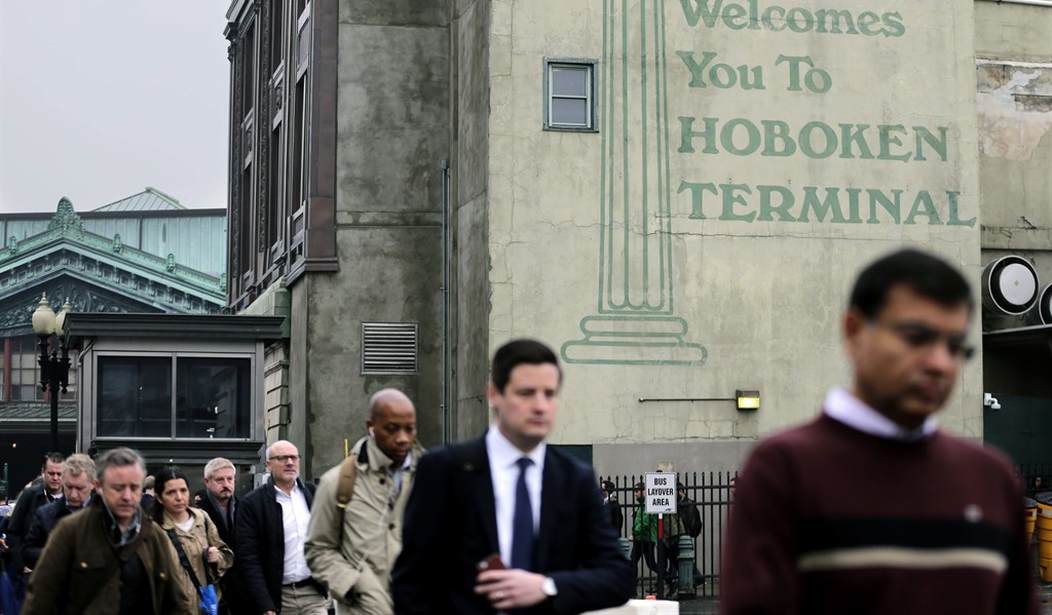There's a reason so many people who live in big cities when taking a vacation, leave those cities and head out into greener surroundings. Trust me, we see plenty of summer tourists here in the Great Land every year, enjoying the natural surroundings and scenery, and a lot of them come from major urban areas. Many, probably most, people find such surroundings relaxing. I like trees; I grew up on 60 acres of hardwood timber in northeast Iowa, and while I have cut down or helped in the cutting down of over a hundred trees, I have planted or helped in the planting of thousands.
People like trees, even in cities. They provide shade in summer, their roots soak up water and prevent excess, eroding runoff after a rain, and they just make the surroundings generally more pleasant. So, when some urban areas start encouraging planting and keeping trees to address climate change, well, it may be a silly reason, but it's still a good idea.
Hoboken, New Jersey, is one of those cities.
Hoboken, like many other cities, has a challenge. When the sun beats down on its roads, sidewalks and buildings, that heat is absorbed and then released, only making the air hotter.
The city is ready to start tackling the problem by creating a Division of Urban Forestry and planting 300 new trees in public spaces.
The city has invested heavily in expanding park space and adding underground storage for flood prevention, but this will be the first effort of this scale in recent years focused exclusively on its tree canopy.
Trees indeed make the surroundings more pleasant, and if the city is going to spend taxpayer's money on anything, at least this is something that makes the surroundings more pleasant - and is a lot less stupid than a lot of things they could be spending money on.
Jersey City is taking another tack to the same end.
Jersey City, meanwhile, is looking to preserve urban foliage through a new law that would require a permit to remove a tree on private property.
In addition to cooling cities, trees help reduce stormwater by absorbing the water directly into their roots. They are disproportionately found in wealthier neighborhoods.
“As there has been a growing interest in what cities can do to improve the environment both within the city and the global challenges that we face, there’s been a growing interest in the ways that urban forestry can contribute to these efforts,” said Allyson Salisbury, a professor of urban forestry at Rutgers University.
We've been over the whole climate change hooraw time and again; the entire issue is troubled by bad data, by the refusal to consider nuclear power, by the intentions to spend taxpayer trillions on questionable solutions desperately seeking problems.
See Related: STUDY: Errors in Temperature Measuring Wildly Inflate Warming Claims
Carbon Capture and Storage: An Expensive Solution Looking for a Problem
But in this case, people in these concrete hells at least get some trees out of the deal. Now, they aren't going to get big tracts of forest, but there's nothing wrong with a couple of shade trees in a small plot of grass in front of an apartment building; the grass, the shade, might just encourage neighbors to gather, to get to know one another, under the shade of a maple or cottonwood tree. And even if that doesn't happen, the other benefits - shade, beauty - are still there.
Good ideas can arise from bad beginnings. This seems like one of those times.
I like trees. That's why I live among them, on a clearing in the great north woods, part of the vast taiga that covers so much of northern Canada, Alaska, Siberia, all the way through to Scandinavia. Trees are a good thing. Of course, there is the issue of taxpayer dollars being spent on these schemes, but here's the thing: I have long maintained that the government works best when it's as close to the people as possible, and municipal-city - governments are about as close as you get. You can call or email a city council member and reasonably expect an answer. Try that with one of your state senators, and you'll be lucky to get a form letter.
I suspect, though, that in Hoboken and Jersey City, people won't mind having more trees.














